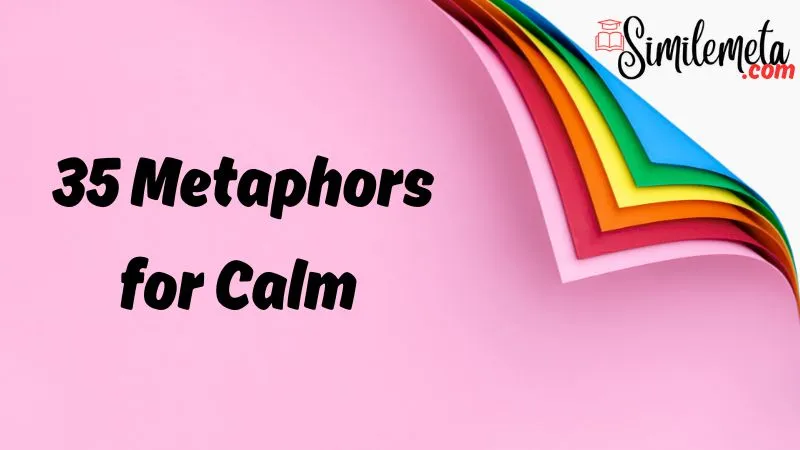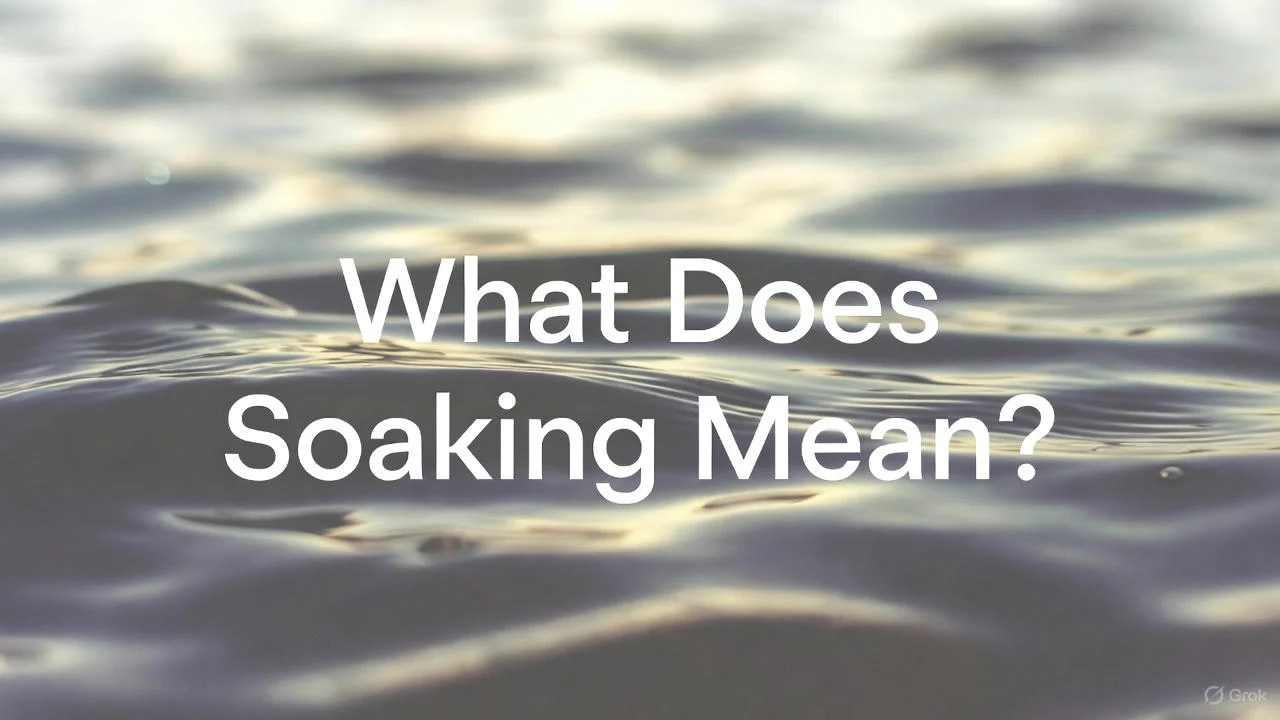Are you searching for the perfect metaphor to describe calmness? If you’re trying to articulate inner peace, a serene moment, or a tranquil setting, finding the right words can be a challenge. Calmness, like happiness, is a profound yet subtle emotion that often requires imagery to express it fully.
This article is your go-to resource for 37 metaphors for calm, with clear meanings, real-life examples, and contextual usage.
Once you go through this, your search for the perfect metaphor for tranquility will be over.
1. Calm is a Still Lake
Meaning: Like a lake undisturbed by ripples, calmness signifies complete peace and stillness.
Examples in Context:
- “Her mind was like a still lake, untouched by the chaos around her.”
- “As the sun set, the stillness of the lake mirrored his inner calm.”
2. Calm is a Soft Whisper
Meaning: A whisper is gentle and quiet, symbolizing the subtlety of calmness.
Examples in Context:
- “Her words were like a soft whisper, soothing everyone in the room.”
- “The calm in the library felt like a whisper of serenity.”
3. Calm is a Gentle Breeze
Meaning: A breeze is soft and refreshing, evoking feelings of ease and tranquility.
Examples in Context:
- The gentle breeze carried the scent of flowers, calming her senses.
- “His reassuring words were like a breeze that eased her worries.”
4. Calm is a Sleeping Child
Meaning: A sleeping child embodies pure serenity and innocence, reflecting perfect calmness.
Examples in Context:
- “As she watched her baby sleep, her heart filled with the calm of a quiet night.”
- “The silence after the storm was like the peaceful breath of a sleeping child.”
5. Calm is a Snowfall
Meaning: Snowfall is quiet and soothing, blanketing everything in a peaceful stillness.
Examples in Context:
- “The falling snow turned the bustling city into a picture of calm and quiet.”
- “Her thoughts settled like a gentle snowfall, soft and unhurried.”
6. Calm is a Candle’s Glow
Meaning: A candle’s steady flame represents warmth and peace, even in darkness.
Examples in Context:
- “The dim light of the candle filled the room with a calming presence.”
- “Meditation brought her a peace as steady as a candle’s glow in a quiet room.”
7. Calm is a Garden in Full Bloom
Meaning: A blooming garden symbolizes harmony and the calm that comes from balanced growth.
Examples in Context:
- “The calm in her soul was like a garden in full bloom after a spring rain.”
- “Walking through the botanical garden gave him the peace he needed.”
8. Calm is a Gentle Wave
Meaning: Gentle waves lapping on the shore create a soothing rhythm, symbolizing tranquility.
Examples in Context:
- “The sound of the gentle waves felt like calmness washing over her.”
- “His voice was like a gentle wave, steady and soothing.”
9. Calm is a Deep Forest
Meaning: A forest is quiet, vast, and still, evoking a sense of peace and grounding.
Examples in Context:
- “The serenity of the deep forest mirrored the calm in her heart.”
- “He found calmness in the woods, where even the trees seemed to breathe in silence.”
10. Calm is a Clear Sky
Meaning: A clear sky represents peace and freedom from turbulence.
Examples in Context:
- “After a hectic day, her mind felt as open and calm as a clear sky.”
- “The sight of the sky, unbroken by clouds, brought him a sense of peace.”
11. Calm is a Quiet Pond
Meaning: A pond reflects everything around it, undisturbed, symbolizing tranquility and peacefulness.
Examples in Context:
- “Her thoughts were as calm as a quiet pond, with no disturbances.”
- “The scene at the lake was like a quiet pond, peaceful and still.”
12. Calm is a Soft Blanket
Meaning: A blanket provides warmth and comfort, much like calmness soothes the mind and body.
Examples in Context:
- “The peaceful embrace of her presence was like being wrapped in a soft blanket.”
- “After the stress of the day, a long bath felt like sinking into a cozy blanket of calm.”
13. Calm is a Peaceful Meadow
Meaning: A meadow evokes wide-open spaces and a serene, peaceful environment, free from distractions.
Examples in Context:
- “His mind felt like a peaceful meadow, undisturbed by any worries.”
- “The silence in the field was like walking through a meadow in the early morning light.”
14. Calm is a Soft Rain
Meaning: Light rain brings a soothing atmosphere, symbolizing calm that refreshes and revives.
Examples in Context:
- “The soft rain on the roof made everything feel more peaceful and serene.”
- “Her voice was like the gentle patter of soft rain, calming and steady.”
15. Calm is a Silent Night
Meaning: The quiet of night symbolizes the perfect stillness that comes with calmness.
Examples in Context:
- “The air was thick with the calm of a silent night, unbroken by sound.”
- “After the turmoil, his thoughts settled into a peaceful silence, like a quiet night.”
16. Calm is a Slow, Steady Stream
Meaning: A stream that flows smoothly and steadily represents tranquility and natural balance.
Examples in Context:
- “Her breath was like a steady stream, flowing slowly with each inhale and exhale.”
- “The meditation session left him with a sense of calm like the flow of a steady stream.”
17. Calm is a Dreamless Sleep
Meaning: A peaceful, dreamless sleep reflects complete rest and tranquility of the mind and body.
Examples in Context:
- “After a long day, he sank into bed and fell into a dreamless sleep of calm.”
- “The night was as peaceful as dreamless sleep, offering a deep and restful stillness.”
18. Calm is a Soft Cloud
Meaning: A soft cloud is gentle and floating peacefully in the sky, evoking a sense of calmness and ease.
Examples in Context:
- “Her mood was light and soft, like a cloud drifting slowly through the sky.”
- “The calm of the morning was like watching a cloud gently float by.”
19. Calm is a Quiet Heartbeat
Meaning: A steady, rhythmic heartbeat symbolizes the tranquility that can come from being in tune with oneself.
Examples in Context:
- “His calm demeanor was like a quiet heartbeat, steady and reassuring.”
- “In the middle of the chaos, her heartbeat was like a silent metronome of peace.”
20. Calm is a Closed Book
Meaning: A closed book represents quietude and undisturbed serenity, as nothing is being actively stirred or opened.
Examples in Context:
- “After the arguments, their relationship felt like a closed book, sealed in silence.”
- “The stillness in the room was as complete as a closed book resting on the shelf.”
21. Calm is a Soft Petal
Meaning: A soft petal represents gentleness and delicate beauty, creating a serene atmosphere.
Examples in Context:
- “Her touch was as calming as the soft petal of a flower brushing against skin.”
- “The calm of the evening was like the gentleness of a petal resting in the wind.”
22. Calm is a Tranquil Desert
Meaning: A desert, often vast and quiet, represents solitude and stillness in the natural world.
Examples in Context:
- “Her mind felt as empty and tranquil as a desert at dawn.”
- “The open road stretched out like a tranquil desert, peaceful and endless.”
23. Calm is a Frozen River
Meaning: A frozen river symbolizes stillness and calm, with no movement or disturbance.
Examples in Context:
- “The silence between them was like a frozen river, unmoving and deep.”
- “The landscape outside the cabin looked like a frozen river, perfectly still under the blanket of snow.”
24. Calm is a Steady Flame
Meaning: A flame that burns steadily without flickering represents consistent peace and stability.
Examples in Context:
- “His presence was like a steady flame, offering warmth and calm without overwhelming anyone.”
- “The candle on the table burned like a steady flame, casting calm light over the room.”
25. Calm is a Soft Shadow
Meaning: A soft shadow is unobtrusive, creating a calming presence that lingers without taking attention.
Examples in Context:
- “Her calm energy was like a soft shadow that subtly created peace in the room.”
- “The afternoon light filtered through the trees, casting a soft shadow over the ground.”
26. Calm is a Lazy Afternoon
Meaning: A lazy afternoon represents leisurely and undisturbed relaxation.
Examples in Context:
- “The day unfolded like a lazy afternoon, with no rush or worries.”
- “Their conversation drifted on like a lazy afternoon, easy and slow.”
27. Calm is a Silent River
Meaning: A silent river suggests deep, unbroken calm, flowing quietly without disruption.
Examples in Context:
- “His thoughts were like a silent river, deep and peaceful, flowing effortlessly.”
- “The room was as quiet as a silent river, with no sound except the faint hum of the air.”
28. Calm is a Floating Feather
Meaning: A feather drifting through the air symbolizes ease and effortless calm.
Examples in Context:
- “Her mood was as light as a floating feather, carried by the breeze of serenity.”
- “The moment felt like a feather floating softly in the air, quiet and unhurried.”
29. Calm is a Clear Mountain Lake
Meaning: A mountain lake reflects the tranquility and clarity of nature.
Examples in Context:
- “After the storm, the landscape was as clear as a mountain lake, untouched and calm.”
- “His clarity of mind was like the surface of a mountain lake, perfectly still and serene.”
30. Calm is a Softly Falling Leaf
Meaning: A leaf gently falling symbolizes grace and peaceful surrender to the moment.
Examples in Context:
- “Her mood shifted like a softly falling leaf, serene and unhurried.”
- “The autumn breeze carried a leaf gently to the ground, its descent quiet and graceful.”
31. Calm is a Wisp of Smoke
Meaning: A wisp of smoke rises quietly and gently, representing peace that dissipates naturally and softly.
Examples in Context:
- “The last traces of her worries floated away like a wisp of smoke into the air.”
- “The calm of the morning was like the wisp of smoke curling up from the chimney.”
32. Calm is a Velvet Touch
Meaning: Velvet represents a smooth, gentle feeling, just like the softness of calm.
Examples in Context:
- “His words were like a velvet touch, reassuring and smooth.”
- “The fabric of the night was as soft as velvet, wrapping her in a sense of peace.”
33. Calm is a Faint Echo
Meaning: An echo, though soft and distant, evokes tranquility by its very nature.
Examples in Context:
- “Her voice was a faint echo in his mind, leaving a calm trace long after she had spoken.”
- “The silence in the house was like the faint echo of a memory, quiet and peaceful.”
34. Calm is a Still Mountain
Meaning: A mountain stands tall and unshaken, symbolizing the steadfastness and permanence of calm.
Examples in Context:
- “In the midst of the chaos, he remained as calm as a still mountain, unmoved by the noise.”
- “The mountain range stretched endlessly, calm and unwavering in the face of time.”
35. Calm is a Soft Tide
Meaning: A tide that flows gently represents peaceful cycles and smooth transitions.
Examples in Context:
- “Her emotions were like a soft tide, ebbing and flowing gently with the rhythm of her thoughts.”
- “The sea was calm, with only a soft tide rolling in and out, lapping at the shore.”
36. Calm is a Deep Breath
Meaning: A deep breath symbolizes taking time to pause, center oneself, and find peace.
Examples in Context:
- “He closed his eyes and took a deep breath, feeling the calm spread through him.”
- “The moment of silence between them felt like a deep breath, long and grounding.”
37. Calm is a Morning Dew
Meaning: Morning dew represents freshness and purity, symbolizing calmness at the start of a new day.
Examples in Context:
- “The early morning air was crisp, filled with the calm of dew on the grass.”
- “Her thoughts were as clear and fresh as the morning dew on the petals.”
Practical Exercise:
Metaphors:
- Calm is a quiet pond
- Calm is a soft blanket
- Calm is a peaceful meadow
- Calm is a soft rain
- Calm is a silent night
Options:
a. “The morning was as serene as a quiet pond, with not a ripple in sight.”
b. “After a long day, wrapping up in a soft blanket gave me the warmth and peace I needed.”
c. “The evening breeze felt like a soft rain, gentle and calming.”
d. “Her voice was as soothing as the calm of a silent night, not a sound out of place.”
e. “The meadow was untouched, its vastness and beauty spreading peace like a calm morning.”
Answer Key:
1 – a
2 – b
3 – e
4 – c
5 – d
Conclusion
Metaphors for calm offer a poetic and vivid way to express tranquility, peace, and serenity.
By comparing calmness to elements of nature or peaceful imagery, these metaphors help convey the depth of stillness in a way that words alone sometimes cannot.
Using these metaphors in everyday language can bring a sense of calm and serenity to both our communication and our lives.




